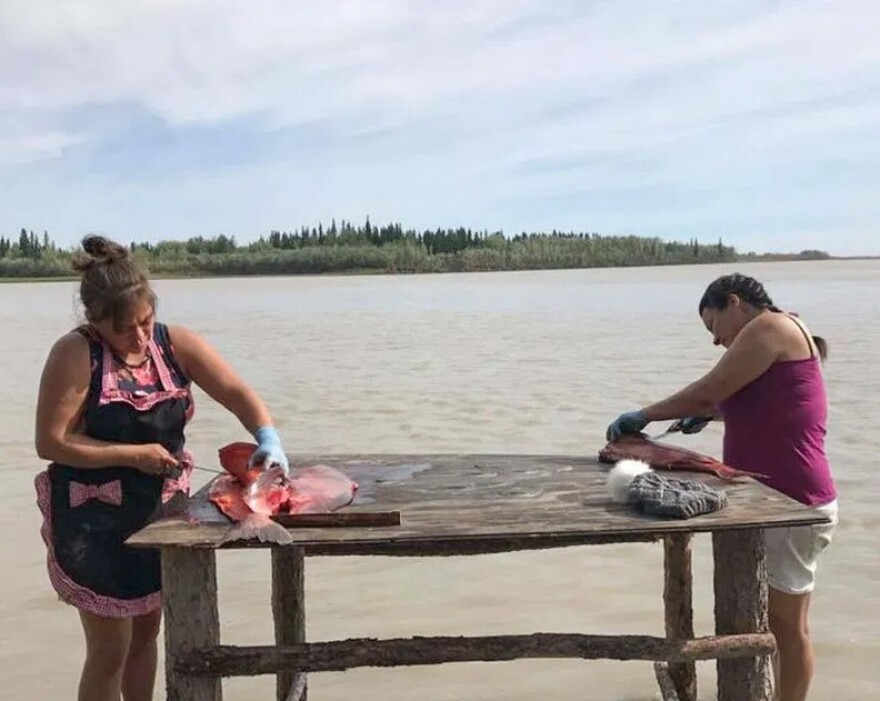Native ways of knowing are often ignored in Western Science. A new program recruiting now will be investing in Native scientists who can broaden the outlook of research, particularly in fisheries.
A new graduate traineeship program at the University of Alaska Fairbanks is called “Tamamta,” which means “all of us” in the Sugpiaq and Yup’ik languages.
The idea is to broaden and diversify graduate education in fisheries and marine sciences through greater inclusion of Indigenous peoples and knowledge.
“Our major goal is really transforming how we teach about fisheries. Give recognition to the amazing depth of knowledge that Indigenous people have. Western science and management systems pretty much make that invisible.”
That’s Dr. Courtney Carothers, of the UAF College of Fisheries and Ocean Sciences, or CFOS, who is the principal investigator on the project.
About 20 percent of Alaska identifies as Native, but less than 3 percent of current students are at UAF College of Fisheries and Ocean Sciences. This project is recruiting Native scientists and non-Natives to feature Indigenous knowledge in scientific research.
Indigenous people are very much excluded from those systems.
The project was built by a cross-disciplinary group of faculty members from several colleges at UAF. Dr. Jessica Black, a co-investigator from the College of Rural and Community Development, is Gwich'in. She says a goal of the Tamamta is to elevate Native science and management alongside western systems.
“Not tucked underneath, but recognized as intact knowledge systems as they are, represented in the University and in other spheres of decision-making.”
Other spheres like the Alaska Department of Fish and Game, where most of Alaska’s animal resources are managed, and where many UAF graduates go to work. Carothers says as a non-Native she has learned a lot about racism, and she would like this project to draw attention to inequity in the way fisheries are managed.
“Indigenous people are very much excluded from those systems. It’s really awful, to have been at Board of Fisheries meetings, as a scientist, hearing the kind of ignorance that many people in Alaska have. It’s really shocking, and um, we can do better.”
Nearly 80 percent of CFOS fisheries graduates go on to work in state, federal and tribal resource management, and 60 percent remain in Alaska, so Tamamta students are likely to be part of the next generation of scientists and managers in the state.
“I believe that change is happening, but I do think that takes time and critical conversations and adequate representation. So, it will take time.”
And the project has $3 million from the National Science Foundation to do it. The National Research Trainee (NRT) Program, encourages innovation in science, technology, engineering and mathematics (STEM) graduate education training. Funding is also being provided by NSF’s Navigating the New Arctic initiative. The traineeship will be part of the UAF College of Fisheries and Ocean Sciences and is the first NRT in Alaska.
“We’re hoping to recruit about 20 Indigenous and allied non-Indigenous students over the next five years. So, the majority of the money goes to stipends or tuition for students.”
The project is designed with inter-disciplinary classes, cultural immersion, art projects and critical conversations as well as science, to connect Indigenous systems and raise awareness of inequities that might be invisible.
“We have a companion project, hopefully, featuring a Yu’pik artist to make visible the Indigenous connections to fish. You know if you walk into our building at UAF, you’d never know that there’s Indigenous fisheries. There’s not Yu’pik, or Inupiaq or Sugpiak names… really drawing attention to these exclusions and erasures, really trying to turn the lens on that and address that.”
The project is recruiting now for the first cohort, to get started in the fall of 2021.


